D-2: Difference between revisions
Pbcjohnston (talk | contribs) Added photos |
Pbcjohnston (talk | contribs) Added captions and crew muster |
||
| Line 2: | Line 2: | ||
[[File:D-2 with crew signaling.jpg|left|500px]] | [[File:D-2 with crew signaling.jpg|left|500px]] | ||
[[File:D- | <div style="text-align: justify;"><span style="color:#00008B">Grayling underway during maneuvers with her sister boats, likely in Cape Cod Bay in the summer of 1910 or 1911. The two men on the forward deck are practicing with semaphore flags. One man moves the flag to the correct position for the signal, the other uses binoculars to read the response. The object between the two men is the [[Allied Signal Bell|'''Allied Signal Bell''']], an underwater signaling device used to communicate with other submerged submarines. | ||
At the top of the photo can be seen the boat's periscopes. These are fixed height periscopes meaning they neither raise or lower but they do rotate. They are positioned so both can be used at the same time and not interfere with the view of the other. | |||
Between them is the ship's air operated whistle. At the top of the #2 periscope is the Submarine Division Three Pennant meaning she is the SUBDIV THREE flagship. Normally this is where the submarine's commissioning pennant would be flown from. | |||
Also attached to the #2 periscope, since it neither raises nor lowers, is a small yardarm with hoists for signal flags to be flown from. Heavy stays can be seen fore and aft holding the periscopes rigid and preventing the barrels from warping, destroying the optics. | |||
<small>Photo courtesy of NARA</small> | |||
[[File:Red bar sub new.jpg]] | |||
<center> | |||
USS Grayling (Submarine No. 18) crew muster for April 15, 1910. Data is incomplete due to missing or lost records. | |||
•Bingham, Donald C. - Lieutenant - age 27 - Born: Alabama<br> | |||
•Jewell, Joseph W. - Ensign - age 23 - Born: New Hampshire<br> | |||
•Stephens, William H. - CGM - age 26 - Born: Ireland<br> | |||
•Burnett, Arthur F. - GM 1c - age 24 - Born: Massachusetts<br> | |||
Brooks, Lewis - GM 2c - age 25 - Born: Ohio<br> | |||
•Young, George S. - GM 2c - age 23 - Born: Michigan<br> | |||
•Rogers, James D. - GM 3c - age 29 - Born: Ohio<br> | |||
•Garrison, George W. - CMM - age 47 - Born: Maryland<br> | |||
•Singleton, Roy F. - MM 1c - age 27 - Born: Pennsylvania<br> | |||
•Wright, Lawrence A. - MM 1c - age 27 - Born: New York<br> | |||
•Drew, Walter H. - MM 1c - age 29 - Born: Massachusetts<br> | |||
•Blackburn, George - MM 2c - age 22 - Born: Pennsylvania<br> | |||
•Doyle, Fred - MM 2c - age 37 - Born: Rhode Island<br> | |||
•Truse, Leo S. - MM 2c - age 20 - Born: Michigan<br> | |||
•Thorpe, James E. - MM 2c - age 21 - Born: Pennsylvania<br> | |||
•Daniels, James H. - CEM - age 27 - Born: West Virginia<br> | |||
•Gruber, Henry J. - EM 1c - age 23 - Born: New York<br> | |||
•Wilson, Elmer E. - EM 1c - age 26 - Born: District of Columbia<br> | |||
•Saunders, Sidney L. - EM 2c - age 23 - Born: Massachusetts<br> | |||
•Van Etter, Allan - EM 2c - age 22 - Born: Ohio<br> | |||
•Siedschlag, Harry M. - GM 2c - age 23 - Born: Michigan<br> | |||
<small>Thank you to Linda Talbott of the US GenWeb Census Project® for providing this information.</small> | |||
</center> | |||
[[File:Red bar sub new.jpg]] | |||
[[File:D-2 stbd bow.jpg|left|500px]] | [[File:D-2 stbd bow.jpg|left|500px]] | ||
Grayling seen from the starboard bow, location unknown, approximately 1910-1911. She is backing away from a mooring. | |||
<small>Photo in the private collection of Ric Hedman.</small> | |||
[[File:Red bar sub new.jpg]] | |||
[[File:D-2 with bow planes.jpg|left|500px]] | [[File:D-2 with bow planes.jpg|left|500px]] | ||
Grayling served as a test ship for an experimental bow planes installation. The location is not known, but the date was sometime in 1910. These planes were temporary and were removed once the testing was completed. At 134 feet in length, the D-class boats had reached the limit of what was controllable submerged without a control surface at the bow. The hull length was such that the stern planes were having trouble overcoming the "plane effect" of the longer hulls. All subsequent classes would have bow planes, whose primary purpose was to control depth, while the stern planes controlled angle. | |||
<small>Photo courtesy of the Submarine Force Library & Museum.</small> | |||
[[File:Red bar sub new.jpg]] | |||
[[File:D-2 with sitting crewman.jpg|left|500px]] | |||
Photo of a crewman on the D-2, circa 1912. The numbers 2 over 4 are a squadron designations, not the hull number. The D-2 at one point in her career was stationed out of Key West, Florida, home of the 2nd Submarine Squadron. The number 4 is her position with-in the squadron when steaming in formation. | |||
Resting on top of the bridge fairwater is the topside helm wheel and the submerged submarine "fish" flag. The flag is rigid so it can be seen when attached to the top of the highest periscope. This was so the submarines wouldn't be run down while making practice dives and exercises. Forward is the stub, with locking keys, of a ventilator, with another vent cowl seen aft of the first one. | |||
The bulge on the side of the periscope sheers is probably a support bearing for the forward periscope. | |||
<small>Photo in the private collection of Ric Hedman.</small> | |||
[[File:Red bar sub new.jpg]] | |||
[[File:D-2 and schooner.jpg|left|500px]] | [[File:D-2 and schooner.jpg|left|500px]] | ||
This photo is the D-2 leaving from Providence, Rhode Island and passing Conimicut Light at the mouth of the Providence River. On August 19, 1912 the D-2 is reported to have left Newport, RI and travelled to Providence. This photo is dated, on the back, as being September 7, 1912. The photo taker even signed his named to the picture as Anthony W. Robinson, and he erroneously placed the location as Boston Harbor. The land in the background is Warwick, RI. There seems to be light wind as the schooner has all sail raised but is making little headway. | |||
<small>Photo in the private collection of Ric Hedman.</small> | |||
[[File:Red bar sub new.jpg]] | |||
[[File:D-2 conimicut light.jpg|left|500px]] | [[File:D-2 conimicut light.jpg|left|500px]] | ||
Contemporary image of the Conimicut Light House on the left and the one from the above photo on the right. Giving consideration for over 100 years of possible changes and modifications to the light house, our guess would be that this is the same structure. Thanks to Thomas Tag, Technical Advisor for the U.S. Lighthouse Society for his input. Feedback on this issue is welcome. | |||
<small>Photo in the private collection of Ric Hedman.</small> | |||
[[File:Red bar sub new.jpg]] | |||
[[File:D-2 port bow.jpg|left|500px]] | [[File:D-2 port bow.jpg|left|500px]] | ||
D-2 running along the New England coast circa 1912. This is likely taken in Cape Cod Bay on or near the measured mile off Provincetown. | |||
There are nine men topside, one of whom seems a bit out of place with the others (second from right). It is suspected he might be a rider. His uniform doesn’t look right. It looks like something that a yacht club member would wear. The men highest on the conning tower have their arms wrapped around the #1 and #2 periscopes to hold on. In this seaway the submarine is probably rolling to a large degree. | |||
<small>Photo in the private collection of Ric Hedman.</small> | |||
[[File:Red bar sub new.jpg]] | |||
[[File:D-2 with hull number.jpg|left|500px]] | [[File:D-2 with hull number.jpg|left|500px]] | ||
D-2 is seen in this photo wearing her hull number 18. Behind her is the D-1 with her 17 number on her fairwater. There is a third submarine in the distance on the left. It could be the D-3 but that can't be verified as the photo quality is too poor. This photo was taken on the Thames River just off Submarine Base New London on the Groton side of the river. Date is circa 1920. | |||
There are line handlers topside with heaving lines ready to toss to the pier or vessel she may be getting ready to moor to. Mooring lines are piled on the deck ready to be pulled to the mooring. There look to be a helmsman and an officer on the bridge. There does not look to be any engine exhaust so she is most likely answering bells on the battery. This allows her to rapidly back down. These gasoline engines were not reversable, so to back down she had to do so on the battery. You can see the prop wash traveling forward along the hull. | |||
D-2 is showing a unique modification at this point in her career. The aft end of the fairwater has been flared outward to provide an enlarged deck in this area. This is a permanent modification built into the structure of the fairwater. | |||
<small>Photo in the private collection of Ric Hedman</small> | <small>Photo in the private collection of Ric Hedman.</small> | ||
[[File:Red bar sub new.jpg]] | [[File:Red bar sub new.jpg]] | ||
Revision as of 17:40, 27 October 2023
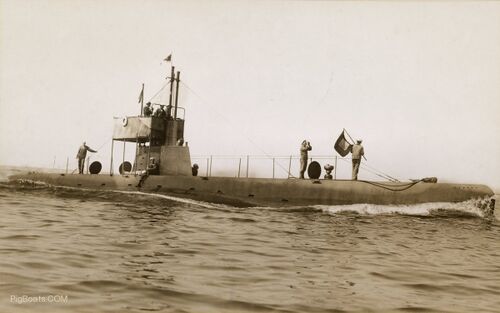
At the top of the photo can be seen the boat's periscopes. These are fixed height periscopes meaning they neither raise or lower but they do rotate. They are positioned so both can be used at the same time and not interfere with the view of the other.
Between them is the ship's air operated whistle. At the top of the #2 periscope is the Submarine Division Three Pennant meaning she is the SUBDIV THREE flagship. Normally this is where the submarine's commissioning pennant would be flown from.
Also attached to the #2 periscope, since it neither raises nor lowers, is a small yardarm with hoists for signal flags to be flown from. Heavy stays can be seen fore and aft holding the periscopes rigid and preventing the barrels from warping, destroying the optics.
Photo courtesy of NARA
USS Grayling (Submarine No. 18) crew muster for April 15, 1910. Data is incomplete due to missing or lost records.
•Bingham, Donald C. - Lieutenant - age 27 - Born: Alabama
•Jewell, Joseph W. - Ensign - age 23 - Born: New Hampshire
•Stephens, William H. - CGM - age 26 - Born: Ireland
•Burnett, Arthur F. - GM 1c - age 24 - Born: Massachusetts
Brooks, Lewis - GM 2c - age 25 - Born: Ohio
•Young, George S. - GM 2c - age 23 - Born: Michigan
•Rogers, James D. - GM 3c - age 29 - Born: Ohio
•Garrison, George W. - CMM - age 47 - Born: Maryland
•Singleton, Roy F. - MM 1c - age 27 - Born: Pennsylvania
•Wright, Lawrence A. - MM 1c - age 27 - Born: New York
•Drew, Walter H. - MM 1c - age 29 - Born: Massachusetts
•Blackburn, George - MM 2c - age 22 - Born: Pennsylvania
•Doyle, Fred - MM 2c - age 37 - Born: Rhode Island
•Truse, Leo S. - MM 2c - age 20 - Born: Michigan
•Thorpe, James E. - MM 2c - age 21 - Born: Pennsylvania
•Daniels, James H. - CEM - age 27 - Born: West Virginia
•Gruber, Henry J. - EM 1c - age 23 - Born: New York
•Wilson, Elmer E. - EM 1c - age 26 - Born: District of Columbia
•Saunders, Sidney L. - EM 2c - age 23 - Born: Massachusetts
•Van Etter, Allan - EM 2c - age 22 - Born: Ohio
•Siedschlag, Harry M. - GM 2c - age 23 - Born: Michigan
Thank you to Linda Talbott of the US GenWeb Census Project® for providing this information.
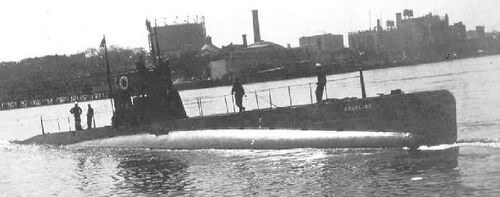
Grayling seen from the starboard bow, location unknown, approximately 1910-1911. She is backing away from a mooring.
Photo in the private collection of Ric Hedman.
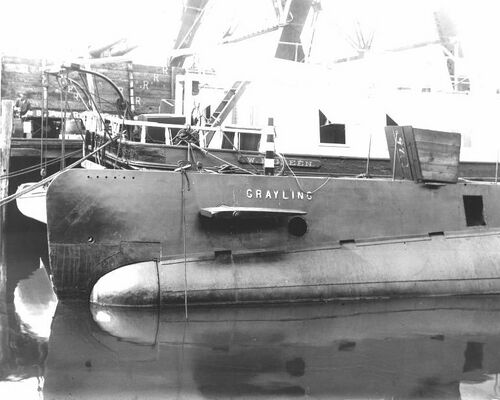
Grayling served as a test ship for an experimental bow planes installation. The location is not known, but the date was sometime in 1910. These planes were temporary and were removed once the testing was completed. At 134 feet in length, the D-class boats had reached the limit of what was controllable submerged without a control surface at the bow. The hull length was such that the stern planes were having trouble overcoming the "plane effect" of the longer hulls. All subsequent classes would have bow planes, whose primary purpose was to control depth, while the stern planes controlled angle.
Photo courtesy of the Submarine Force Library & Museum.
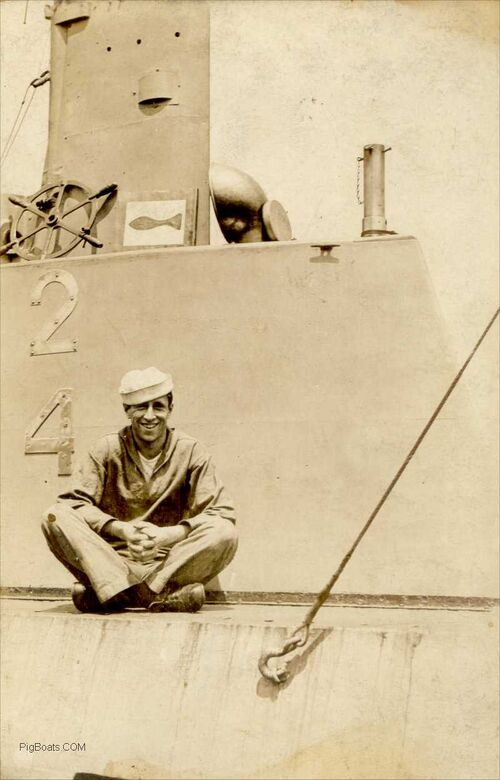
Photo of a crewman on the D-2, circa 1912. The numbers 2 over 4 are a squadron designations, not the hull number. The D-2 at one point in her career was stationed out of Key West, Florida, home of the 2nd Submarine Squadron. The number 4 is her position with-in the squadron when steaming in formation.
Resting on top of the bridge fairwater is the topside helm wheel and the submerged submarine "fish" flag. The flag is rigid so it can be seen when attached to the top of the highest periscope. This was so the submarines wouldn't be run down while making practice dives and exercises. Forward is the stub, with locking keys, of a ventilator, with another vent cowl seen aft of the first one.
The bulge on the side of the periscope sheers is probably a support bearing for the forward periscope.
Photo in the private collection of Ric Hedman.

This photo is the D-2 leaving from Providence, Rhode Island and passing Conimicut Light at the mouth of the Providence River. On August 19, 1912 the D-2 is reported to have left Newport, RI and travelled to Providence. This photo is dated, on the back, as being September 7, 1912. The photo taker even signed his named to the picture as Anthony W. Robinson, and he erroneously placed the location as Boston Harbor. The land in the background is Warwick, RI. There seems to be light wind as the schooner has all sail raised but is making little headway.
Photo in the private collection of Ric Hedman.
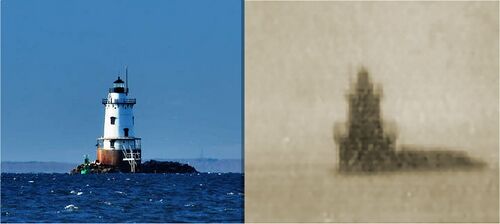
Contemporary image of the Conimicut Light House on the left and the one from the above photo on the right. Giving consideration for over 100 years of possible changes and modifications to the light house, our guess would be that this is the same structure. Thanks to Thomas Tag, Technical Advisor for the U.S. Lighthouse Society for his input. Feedback on this issue is welcome.
Photo in the private collection of Ric Hedman.
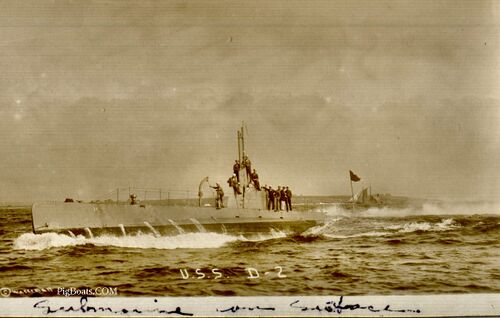
D-2 running along the New England coast circa 1912. This is likely taken in Cape Cod Bay on or near the measured mile off Provincetown.
There are nine men topside, one of whom seems a bit out of place with the others (second from right). It is suspected he might be a rider. His uniform doesn’t look right. It looks like something that a yacht club member would wear. The men highest on the conning tower have their arms wrapped around the #1 and #2 periscopes to hold on. In this seaway the submarine is probably rolling to a large degree.
Photo in the private collection of Ric Hedman.
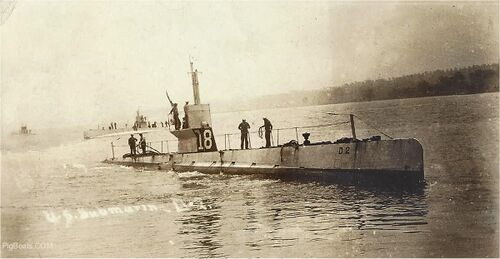
D-2 is seen in this photo wearing her hull number 18. Behind her is the D-1 with her 17 number on her fairwater. There is a third submarine in the distance on the left. It could be the D-3 but that can't be verified as the photo quality is too poor. This photo was taken on the Thames River just off Submarine Base New London on the Groton side of the river. Date is circa 1920.
There are line handlers topside with heaving lines ready to toss to the pier or vessel she may be getting ready to moor to. Mooring lines are piled on the deck ready to be pulled to the mooring. There look to be a helmsman and an officer on the bridge. There does not look to be any engine exhaust so she is most likely answering bells on the battery. This allows her to rapidly back down. These gasoline engines were not reversable, so to back down she had to do so on the battery. You can see the prop wash traveling forward along the hull.
D-2 is showing a unique modification at this point in her career. The aft end of the fairwater has been flared outward to provide an enlarged deck in this area. This is a permanent modification built into the structure of the fairwater.
Photo in the private collection of Ric Hedman.
Page created by:
Ric Hedman & David Johnston
1999 - 2023 - PigBoats.COM©
Mountlake Terrace, WA, Norfolk, VA
webmaster at pigboats dot com
